- Home
- Lynne Truss
Cat Out of Hell Page 8
Cat Out of Hell Read online
Page 8
Feeling I should do something, I looked up Seeward on the internet. The result should not have surprised me, but it did. I was astonished. Although he had been deceased for 50 years, Seeward was still very big news as far as the internet was concerned; thousands and thousands of followers were out there in the so-called global “community” (what a wicked misnomer) of lonely, gullible nutcases.
“Shit,” I said, when I saw the scale of it. Watson looked sharply up at me, and I apologised.
It turned out that Seeward could be googled in umpteen ways – John Seeward diabolist, John Seeward suicide, John Seeward collector, John Seeward immortality, John Seeward cat master. Scanning quickly through the various sites, I found that opinion was divided on whether Seeward was a diabolist himself, or merely the cause of diabolism in others. What was generally agreed was that, having “investigated” a famous haunted manor house in Dorset in the early 1930s for a newspaper feature, he had gone on to buy the property and convert it into a satanic weekend retreat for séances, devil-worship, pagan rites, licentious blood-quaffing and so on. Harville Manor became a by-word for depraved goings-on, and after he moved in permanently after the war, he hardly ever left the grounds until the day in September 1964 when his lifeless body was found hanging from a tree in the garden.
Miraculously, there were photographs. There were press shots of Seeward with some of his celebrity house-guests, many of them elfin young men with emphatic side partings wearing exotic costume and eyeliner: presumably, Seeward and his friends made larky home movies – the sort of thing you see with the young Evelyn Waugh wearing an ill-fitting blonde wig and pretending to puff on a pipe. In the photographs, I spotted Charles Laughton and Elsa Lanchester among the guests; also Ivor Novello and other musical stars. The Duke and Duchess of Windsor appeared in pictures so frequently, you could believe they lived there. But the most notable thing was the cats. Seeward kept scores of them. In every picture there would be half a dozen or more. In one disturbing image, one of the elfin young men lay prone in an orchard, absolutely surrounded by cats – about fifty of them, arranged in ranks, and all apparently on the point of pouncing.
In the end, I decided to make a file of these cat pictures, and started dragging them off the websites, hardly looking at them as I did so – and then I spotted him – the Captain – and I shouted “Yes!” Because, well, yes, there he was. I knew him at once. In several pictures, Seeward was holding the Captain in his arms (which can’t have been easy, given his size). “Ahoy there, Captain!” began one of the extended captions, but I didn’t care; I hardly needed the confirmation by now. A debonair Seeward posed with his arms folded beside the Captain sitting on a gate post. With a cigarette suspended from his lower lip, Seeward manfully pushed a wheelbarrow with the Captain on board, wearing a jaunty sailor’s cap. The Captain sat in the bucket of an old-fashioned stone well in the grounds (imagine any other cat doing that!), while Seeward appeared to be turning the handle. The Captain challenged Seeward at chess, sitting on a table across from him, his paw resting on the White Queen, as if about to announce checkmate.
As I was scanning through the various websites, something struck me.
“Hold on,” I said. “Of course!”
I opened the old “Roger” file. That Elizabethan chimney I had spotted in one of the old photographs: was the picture taken at Seeward’s house? Not remembering which jpeg was which, I opened both of the old black-and-white photographs – the first of Roger with an unknown man among the bluebells; the second of Roger and the Captain lazing in the long grass with the mysterious blur high in the foreground.
I whistled. There was no doubt about it. The unknown man with the cigarette was unknown no longer: it was John Seeward, celebrated ghost hunter and over-the-top cat fancier. And to judge by the dating of the other pictures I’d been looking at, this had been taken at some point in the 1940s. The other picture in the “Roger” file was – from the trees and the distinctively tall and curly brick chimney there was no doubt – taken in the garden at Harville. Studying it now, I noticed for the first time a date scratched in the corner of the negative – September 3rd, 1964. It sounded familiar, and for a good reason. This was the day that John Seeward hanged himself, leaving no note. The significance of this picture was revealed at last. This was the place he had done it. And while the cats lolled carelessly in the grass beneath, like Charles Ryder and Sebastian Flyte in the early, hedonistic chapters of Brideshead, the image in the blurry foreground was of Seeward’s feet – the brogue shoes of a man dangling from a tree, on a beautiful late summer’s day, in his own historic garden.
Watson was woofing and scratching at the study door, wanting to get out. I ignored him. I was lost in this search. Where had Seeward got the money to fund this lifestyle? Surely not from writing the occasional piece about haunted houses for the illustrated weekly press? There was no suggestion he had come from a moneyed background.
“John Seeward wherewithal” I typed into Google, but of course the word meant nothing to the internet. “John Seeward means” got me no closer. “John Seeward money” I finally typed – and here, at last, was some information, though it was sparse and speculative. Evidently, Seeward’s earnings as a journalist came nowhere near accounting for his seriously wealthy lifestyle; especially, it could not have paid for the collection, which was extremely valuable. Did the Devil himself subsidise John Seeward? You would be surprised by the number of sentient beings, capable of typing on a keyboard, who believe that he literally did. As far as many people were concerned, moreover, rural Dorset was virtually the Devil’s second home. I found a news feature about Seeward, printed by a local paper after his death, in which various residents of the area attested to the “goings-on” at Harville Manor, and complained of such things as spooked livestock and an oak tree splitting down the middle at midnight on a cloudless Halloween. They also complained about the cats. A Mr Corbett (aged 65) alleged that there were rituals at the “big house” in which cats were sacrificed and otherwise used in devil-worship. His own cat Tina had once disappeared for three months, and he was sure she was at Harville all that time. When she came back, she was never the same again. For one thing, she would sit staring at him, until he felt queasy. And she would also go into fits – foaming at the mouth and writhing and spitting – whenever the church bells rang out, or Songs of Praise came on the telly.
Few of the locals had ever seen Seeward, though. He kept himself to himself, especially after a scandal in 1952 involving a local schoolgirl. The case was never proved, but unsurprisingly, the hoo-ha did nothing to make him less unpopular with his suspicious neighbours. For the last twelve years of his life, he never left the grounds of Harville, and he allowed very few visitors inside. It was believed that he concentrated on reading and curating his impressive collection of arcana, and he also wrote the majority of his books in this period – books that he published privately and circulated secretly.
I checked back on my notes. When was Nine Lives written? It was published in 1960. I had to find it. More than that, I had to make sure it never got into the hands (or paws) of the Captain. But why should I be taking sides with Roger? Roger was an evil cat who not only deliberately ignored the sound of a woman dying in a cellar, but also fiendishly urinated on people’s mobile phones as a matter of course to electrocute their insides and destroy incriminating evidence! What should I do? I kept thinking of poor Mary, caught up in this thing purely because she was clever and helpful and organised, and soft-hearted enough to take pity on someone like Winterton. And all this time, while I was trying to think, Watson was being incredibly tiresome, scratching at the study door, and whining to be let out.
“All right!” I said, impatiently.
I let him out, and he raced to the kitchen, barking. I went straight back to the computer.
I had decided to have one last trawl on Seeward, and then go to bed. It was midnight by now, but it couldn’t be helped. When I had finished my research, Watson would have his bedtime c
hicken treat and we would go upstairs together as we had done every night since Mary died. But before we did that, there was something on YouTube I hadn’t looked at yet, and I had a feeling I shouldn’t overlook it. It had come up when I was looking under “John Seeward, cat mastery,” and it turned out to be a five-minute black-and-white silent film, shot at Harville Manor in the 1930s.
It started with a make-shift stage curtain rigged up in the garden on a sunny day. Seeward, smoking, entered from the left of the screen, and addressed the camera directly. Dressed very smartly in tweed, he had a slim figure and a light step; he might have been about to break into dance. There being no soundtrack, one could only guess at what he was saying. He indicated the curtain, and smiled. A breeze caught the curtain and Seeward waited for everything to settle before continuing. He evidently asked the cameraman if he was ready, then he walked to the right-hand side of the frame, and ceremoniously (with cigarette clamped between his teeth) used both hands to pull a cord to open the makeshift curtain.
Watson was now barking frantically in the kitchen. He was getting quite annoying. I paused the film and called to him. “Watson, stop it! I’m doing something!”
Seeward came forward again to explain, indicating what the curtain had revealed: a covered table with a cage on it. Inside the cage was a rabbit, cheerfully nibbling some lettuce. Seeward opened the cage, gently lifted the rabbit out, and placed it on the table, while putting the cage on the ground. Then he looked to the right, and a large tabby cat jumped up. Seeward beamed at him, and spoke to him. He fondled the cat’s ears, and stroked his fur. The cat pressed its face against Seeward’s chest. All this time, the rabbit (sensibly) backed off; but it didn’t have the requisite athletic skill to jump to the ground and run away. Seeward placed the rabbit facing the cat – about two feet away. And then, in the blinking of an eye, three things happened. The cat looked up at Seeward, who nodded. The cat made the slightest dart forward with his head, as if hissing. And the rabbit fell back, dead.
Seeward then approached the camera, and went behind it; there was a wobble as the camera was handed over to him; then a second figure – presumably the cameraman, relieved of his duties – walked to the table, to examine the body. He was a pale young lad in agricultural attire, nothing like the sort of person normally seen at Seeward’s house parties.
He looked astonished. He held the rabbit up by the leg. “It’s dead,” he mouthed, looking towards the camera. He pulled a face. Then three things happened very quickly again. The cat looked quickly in the direction of the camera, then made the same small hissing motion as before, and the farmer boy instantly dropped to the ground.
It was the end of the footage. I switched off the computer. There was a buzzing in my head, but otherwise it was quiet. I rubbed my temples and sighed.
It was only then that I realised Watson wasn’t barking any more.
“Watson?” I called. “Watson, where are you? Are you all right?”
There was no response. The house was silent. I stood up and went to the hallway. “Watson? Watson, where are you?” I went to the kitchen – and he wasn’t there. I tried the back door; it was locked. Where had he gone? Why wouldn’t he come when I called him?
“Watson!”
Not a sound. No pitter-pat of claws on the floorboards; no woof; nothing. I shiver of dread went through me. Oh no. Oh no, not Watson. He’s all I have.
“Watson, where are you?”
I stopped breathing and closed my eyes. In all my resolutions about finding Seeward’s book, keeping it from the Captain, and not trusting Roger further than I could throw him, I’d forgotten the most important thing of all: protect Watson. Protect Watson from everything: from evil cats using the hinges of heavy gates as a kind of nutcracking device; from evil cats who could cause instant death with a single application of overpowering malevolence. To lose my dog would be beyond endurance. What had he been barking at, just now? Why hadn’t I paid attention to him? What had he been barking at?
“Watson!” I called, from the hallway. “You’re not hurt, Watson? For God’s sake, say that you’re not hurt!”
I stood still and listened. I could barely keep myself from weeping. How Mary had loved him. How we had both loved that little dog. How I needed him now, more than ever.
“Watson?” I tried to say it calmly. And at last I got a response.
“Alec, in here.”
I jumped in the air.
“Alec, in the living room. Don’t turn the light on.”
It was a male voice, with a clipped, authoritative, unflappable tone. I stopped breathing. Who was it? Who was in my house? How had he got in? What had he done with Watson? He was telling me to go into the living room, but I wasn’t obeying. Not because I was brave or defiant, but because in this situation I just couldn’t move my legs.
I forced myself to take a deep breath. “Where’s Watson?” I demanded. “What have you done with him?”
“Listen, we have to get out of here, and I’ve got a plan. Pack enough chicken treats for a fortnight.”
What can I say? It was Watson. And believe it or not, he sounded exactly like Daniel Craig.
PART THREE
CORRESPONDENCE
Email from Alec Charlesworth to William Caton-Pines
Sent: Thursday, January 15, 4:25 PM
Subject: Roger
Attachments: Beside the sea (folder) and HOME (file)
Dear William Caton-Pines,
This is a very difficult email to write. The long and short of it is that I have heard of what happened at Lighthouse Cottage, and much as I have resisted becoming involved in the story of the two individuals known as Roger and the Captain, I find that I am now in it absolutely up to my neck. I have had to leave my house! I’ve had to move into a B & B near the station! It’s really disgusting, too – a big damp patch on the wall above the bed, and an air-freshener on the landing so toxic that I have to carry Watson quickly to our room, for fear the smell will kill him. But I suppose that’s neither here nor there. At least they let me check in after midnight, and have turned a blind eye to the dog. But you don’t want to hear about that. Good God, I’m beginning like Winterton! You don’t even know who I am yet! Rather than explain everything here, I have attached a folder and a file for you to read – some of which you will be familiar with, as it was written by you in the first place. I think it will make clear everything that’s happened so far. When you have read it all, you will know everything that I know. Which means you will also be aware of many unanswered questions, and many frustrating gaps.
Before you read the attached, I feel I should apologise for some of my “editorialising” in my account of the material in the folder “Beside the Sea” – especially any observations detrimental to yourself. I believe I call you an “idiot” on several regrettable occasions. I had no right to do this. “Staggering stupidity” is a rather inflammatory phrase that leapt out when I was preparing the material to attach with this. On top of this, I noticed an unfounded and speculative reference to “floppy hair” (you might be bald, for all I know), and also remarks such as, “He really is out of his intellectual depth with Roger” and “For once, he makes an intelligent decision.” I hope you can overlook such uncalled-for slurs. The plain fact is that I did find myself quite captivated by Roger. I can’t help admiring him, even now. I think it was something to do with his educated love of Tennyson’s earlier poetry and his profound aesthetic response to ancient cultural sites. Such intellectual elegance doesn’t come along very often.
I send you all this with a particular purpose. I have a large favour to ask. Since my life is evidently in danger from talking cats with lethal powers who can penetrate academic libraries and engineer the cruel deaths of inoffensive terrier dogs, and since there is no one else in the world with whom I would dare even raise the subject of talking cats – could I persuade you to act as my archivist? I realise I don’t know your current feelings on what happened at the cottage, but please believe that I am app
alled and horrified by everything that happened at Lighthouse Cottage to Jo and to the J-Dog – and to you, too, Wiggy (if I may). I intend that nothing like it shall ever happen again. If I could just feel that the record was being kept somewhere – by you – it would help me face all that has yet to be done. In short, will you be my friend?
Yours sincerely,
Alec Charlesworth, FCLIP
(Fellow of the Chartered Institute of Library and Information Professionals)
Email from Wiggy [Caton-Pines] to Alec Charlesworth
Sent: Friday, January 16, 10:45 AM
Subject: Blimey
Dear Alec Charlesworth,
Blimey. How the hell did you get my email address?
Wiggy
Email from Alec to Wiggy
Sent: Friday, January 16, 11:30 AM
Subject: Blimey
Dear Wiggy,
I’m afraid a certain cat leaked it to Dr Winterton.
Email from Wiggy to Alec
Sent: Friday, January 16, 11:37 AM
Subject: Blimey, Jesus
Alec,
I need to think about this. Jesus. Bit of a bloody shock. Raking it all up again. Wiggy x
Email from Alec to Wiggy
Sent: Friday, January 16, 11:40 AM

 Get Her Off the Pitch! How Sport Took Over My Life
Get Her Off the Pitch! How Sport Took Over My Life Going Loco
Going Loco Talk to the Hand
Talk to the Hand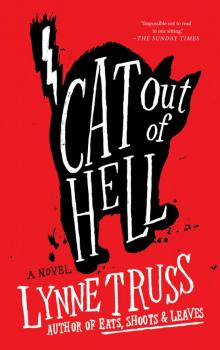 Cat Out of Hell
Cat Out of Hell Eats, Shoots and Leaves
Eats, Shoots and Leaves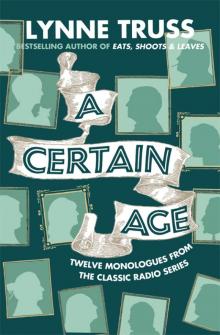 A Certain Age: Twelve Monologues From the Classic Radio Series
A Certain Age: Twelve Monologues From the Classic Radio Series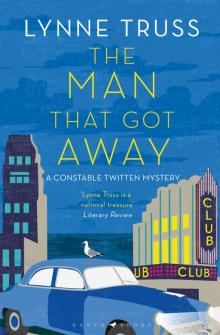 The Man That Got Away
The Man That Got Away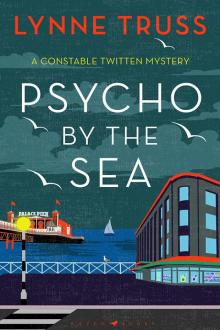 Psycho by the Sea
Psycho by the Sea With One Lousy Free Packet of Seed
With One Lousy Free Packet of Seed Tennyson's Gift: Stories From the Lynne Truss Omnibus, Book 2
Tennyson's Gift: Stories From the Lynne Truss Omnibus, Book 2 Get Her Off the Pitch!
Get Her Off the Pitch! Tennyson's Gift
Tennyson's Gift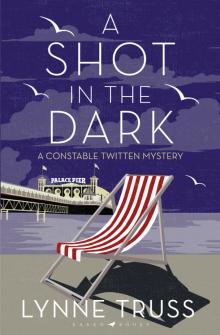 A Shot in the Dark
A Shot in the Dark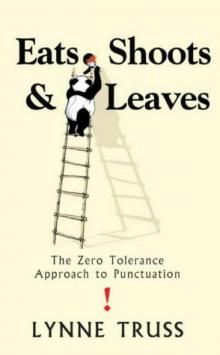 Eats, Shoots and Leaves: The Zero Tolerance Approach to Punctuation
Eats, Shoots and Leaves: The Zero Tolerance Approach to Punctuation